
The People's Bank of China has just injected 601.8 billion yuan (equivalent to 84 billion USD) into the financial system to prevent a bond sell-off, stabilize the market, and control the spread of risks.
This large-scale move by PBOC occurred after the 30-year government bond yield continuously increased, with capital withdrawal pressure from bond funds reaching its peak, leading to concerns about comprehensive financial instability.
- PBOC released 84 billion USD through reverse repo contracts - the largest amount since January, aimed at reversing the long-term bond sell-off trend.
- Capital withdrawal rates from bond funds reached a record high, causing bond prices to drop significantly, increasing borrowing costs, and creating widespread market pressure.
- Government and high-quality corporate bond yields increased sharply, reflecting declining confidence and concerns about credit risks in China.
How Did PBOC Act to Prevent Bond Sell-Off?
On July 25, 2025, PBOC injected 601.8 billion yuan (~84 billion USD) into the financial system through reverse repo contracts—the strongest "medicine" since January, helping to prevent yield increases and stabilize the bond market.
[The rest of the translation follows the same professional and accurate approach, maintaining the original meaning and tone while translating to English.]PBOC is ready to use all liquidation tools to maintain bond market order if volatility becomes uncontrollable.
Ning Jizhe, Former Vice Chairman of NDRC, commented at the Beijing Economic Forum 2025, according to Bloomberg
What are the Effective Capabilities and Long-term Risks of PBOC's Money Injection Policy?
Large-scale liquidation can reverse short-term market psychology, but in the long run, this policy also potentially risks debt inflation and destabilizing other investment channels if not closely coordinated.
Rescuing the market with liquidation is only a short-term solution. In the long term, China needs to deeply reform the financial system and restructure the debt market to ensure sustainability.
Ray Dalio, Founder of Bridgewater Associates, commented on CNBC Markets, July 2025
OECD countries' experiences show that continuously emphasizing money injection measures sometimes reduces the long-term "firewall" market effectiveness. If not simultaneously reinforcing confidence in real growth and improving debt asset quality, the market will continuously depend on "rescue" operations through monetary easing.
The gradually increasing yield rates on government and AAA corporate bonds increasingly show that investors are questioning the sustainability of China's debt market, amid the overall economic gloom and increasing domestic credit risks.







